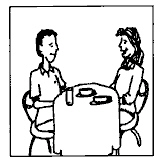 Claude et Sylvie habitent et travaillent à Genève, en Suisse. Ils travaillent tous les deux dans de grandes entreprises. Le week-end, ils aiment s'amuser avec des amis et faire la cuisine. Ils viennent d'inviter quatre amis chez eux pour dîner samedi soir. Claude et Sylvie font les préparatifs.Click here for audio. Qu'est-ce qu'on sert? Écoutez la conversation entre Claude et Sylvie et complétez-la avec les mots que vous entendez.
Claude et Sylvie habitent et travaillent à Genève, en Suisse. Ils travaillent tous les deux dans de grandes entreprises. Le week-end, ils aiment s'amuser avec des amis et faire la cuisine. Ils viennent d'inviter quatre amis chez eux pour dîner samedi soir. Claude et Sylvie font les préparatifs.Click here for audio. Qu'est-ce qu'on sert? Écoutez la conversation entre Claude et Sylvie et complétez-la avec les mots que vous entendez.
Claude:Sylvie, qu'est-ce que tu (1) ____________________ manger samedi soir? Sylvie:Oh, je ne sais pas. Voyons. Marie (2) ____________________ et Étienne n'aime pas (3) ____________________. On peut manger (4) ____________________ peut-être? Claude:Oui. Bonne idée. Je vais (5) ____________________ et (6) ____________________. Sylvie:D'accord. Comme hors d'œuvre j'ai prévu (7) ____________________ de crevettes. Et comme (8) ____________________? Claude:Moi, j'aime (9) ____________________, mais Sophie et Yves (10) ____________________ les (11) ____________________. Sylvie:OK. Maintenant, je commence à (12) ____________________!(4)
Fill in the blank(s) with the appropriate word(s).
du poisson
You might also like to view...
One likely reason that Carly has time to think about other things during the lecture is that the average rate of speech is
Carly is taking a sociology class in which class lectures are very important. Although she typically finds the lectures interesting, she sometimes has difficulty taking notes, partly because her mind wanders and partly because she is not sure what is important to write down. She knows that she has an applied learning style; that is, she prefers tasks that involve practical situations. a. much faster than the speed of thought. b. much slower than the speed of thought. c. slightly slower than the speed of thought. d. much slower than the speed of writing.
Encierre en un círculo la palabra o frase que no pertenece al grupo.
disfrutan se ahogan se divierten
Als Deutschland von den Siegermächten besetzt wurde, _____.
a. war es vollkommen zerstört b. hat es die Weltmeisterschaft gewonnen c. hatte es Einheit
How many common phrases that trivial mental illness are listed in Pugsley's article?
a. five b. three c. six